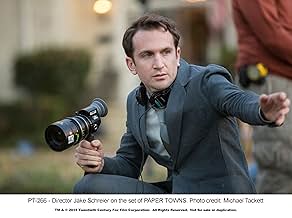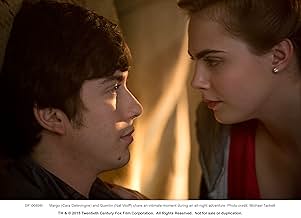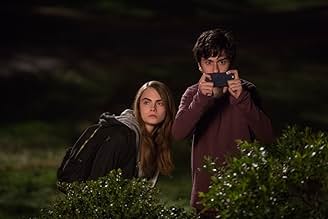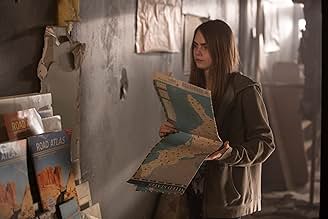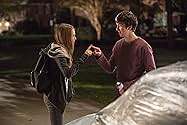IMDb RATING
6.2/10
111K
YOUR RATING
After an all-night adventure, Quentin's lifelong crush, Margo, disappears, leaving behind clues that Quentin and his friends follow on the journey of a lifetime.After an all-night adventure, Quentin's lifelong crush, Margo, disappears, leaving behind clues that Quentin and his friends follow on the journey of a lifetime.After an all-night adventure, Quentin's lifelong crush, Margo, disappears, leaving behind clues that Quentin and his friends follow on the journey of a lifetime.
- Director
- Writers
- Stars
- Awards
- 4 wins & 3 nominations total
Hannah Riley
- Young Margo
- (as Hannah Alligood)
- Director
- Writers
- All cast & crew
- Production, box office & more at IMDbPro
6.2111K
1
2
3
4
5
6
7
8
9
10
Featured reviews
No TFIOS, but There Aren't a Great Many Faults With this Either
Reviewed by: Dare Devil Kid (DDK)
Rating: 3.4/5 stars
"Paper Towns" isn't as deep or moving as it wants to be, yet it's still earnest, well-acted, and thoughtful enough to earn a place in the hearts of teen filmgoers of all ages while providing a breezy, light-hearted nostalgic trip for adult viewers. Unlike "The Fault in Our Stars" (the first, big-screen John Green adaptation), the overall mood here is safe rather than edgy, but what it does do very effectively is capture a particular quality of adolescent yearning.
"Paper Towns" follows the familiar story of the wannabe high- schooler who meets a dreamy girl and everything falls into place. Trying to subvert this stereotypical storyline, the film neatly weaves themes of loneliness, fear, depression, and anxiety into the plot. The film takes a lot of the original spirit of the novel while subverting the story, taking out all the meandering teenage angst and replacing it with a fun, understated film.
It's eventually a bittersweet teen film with much to offer even those of us who have, in theory, grown up, although it never quite reaches its potential of a remarkable coming-of-age drama.
Rating: 3.4/5 stars
"Paper Towns" isn't as deep or moving as it wants to be, yet it's still earnest, well-acted, and thoughtful enough to earn a place in the hearts of teen filmgoers of all ages while providing a breezy, light-hearted nostalgic trip for adult viewers. Unlike "The Fault in Our Stars" (the first, big-screen John Green adaptation), the overall mood here is safe rather than edgy, but what it does do very effectively is capture a particular quality of adolescent yearning.
"Paper Towns" follows the familiar story of the wannabe high- schooler who meets a dreamy girl and everything falls into place. Trying to subvert this stereotypical storyline, the film neatly weaves themes of loneliness, fear, depression, and anxiety into the plot. The film takes a lot of the original spirit of the novel while subverting the story, taking out all the meandering teenage angst and replacing it with a fun, understated film.
It's eventually a bittersweet teen film with much to offer even those of us who have, in theory, grown up, although it never quite reaches its potential of a remarkable coming-of-age drama.
want more adventure
Quentin Jacobsen is an Orlando high school senior with a small comfort zone. He's a band geek with his best friends Ben and Radar. Margo has been living across the street for 11 years. They were friends when she first arrived. They found a dead body but he refused to follow her adventures and they drifted apart. Now suddenly, she climbs into his window. She pulls him into a night of revenge against her cheating boyfriend and her backstabbing friends. She's gone the next day but she has left clues for Quentin to find her paper town. Quentin, Ben, Radar, Radar's girlfriend Angela, and Margo's friend Lacey go on a road trip.
Cara Delevingne shows competent acting and a good intriguing presence which is necessary for the role. The movie starts with her taking our lead on a nice adventure. It has its moments. I like those one-night adventures in movies. Then there is the mystery which is less compelling because I'm mostly waiting for the inevitable road trip. I also like a good road trip and this one has its moments, too. The movie ends with a nice 'lesson'. Everything is fair but nothing is outstanding. The three guys are nice but lacks great charisma. They are more and less regular teens which has its appeal. I like their friendship. As a book, I'm sure this has many fans. As a movie, it needs more adventures and more cinematic excitement. It could have tightened the middle and added more to the road trip when the group is together. This is fine but it could have been much better.
Cara Delevingne shows competent acting and a good intriguing presence which is necessary for the role. The movie starts with her taking our lead on a nice adventure. It has its moments. I like those one-night adventures in movies. Then there is the mystery which is less compelling because I'm mostly waiting for the inevitable road trip. I also like a good road trip and this one has its moments, too. The movie ends with a nice 'lesson'. Everything is fair but nothing is outstanding. The three guys are nice but lacks great charisma. They are more and less regular teens which has its appeal. I like their friendship. As a book, I'm sure this has many fans. As a movie, it needs more adventures and more cinematic excitement. It could have tightened the middle and added more to the road trip when the group is together. This is fine but it could have been much better.
Fantastic first act but only downhill from there
Paper Towns is another coming-of-age story about Quentin and his neighbour Margo and how here mysterious disappearance sends Quentin on a journey to find her through clues she left behind for him. Now i love a good coming-of-age story, so when one is done right and is new and interesting it will probably be something i choose to watch more than once. Unfortunately this will not be one i am eager to re-watch but it is still a good, strong attempt at one of these films but it seems to get lost a few times along the way in terms of its storytelling. I'll start with the characters and performances, because i feel they were definitely the best parts of the film and added so much to making the film pretty enjoyable. Nat Wolff was great at playing Quentin, a shy awkward guy who had a signs of a lot of personality but needed the right people to bring it out. You really get to connect with his character as they made him come across as very real and not like a character per se. I may say that often but there are so many young actors really showing off their best stuff in these smaller personal films. Cara Delevingne was also great as Margo who was also quite odd and mysterious but was also very out there and confident at the same time, a great contrast to Nat's character. The rest of the supporting cast were also well acted, their distinct personalities were at times used for some cheap comedic relief but also had a greater purpose in adding to the complexity of our main character.
The first act of this film is really where the film gets to shine. You get the introduction to these characters (Quentin and Margo) and get to see their relationship and how it has changed and affected both these characters in the lead up to the events in the film. Watching them interact and bond was fascinating and charming at times and was a really good lead up into the events of the second act and understanding their actions. It was fun, light-hearted and was setting itself up for something great. All of the events so far had a fluid lead in to the second act which became more of a mysterious adventure whilst still trying to maintain that fun element somewhat unsuccessfully. The events of the first act are what get you through the very long second act that could have been cut down like 20 minutes. The second act was more focused on building up Quentin's character and having him face some tough and new decisions in his life. Although it was interesting and you do want to see where his character goes it was a noticeable step down from the fun light-hearted enjoyment in the beginning. There was this great interesting relationship set up and you are eager to find out how the film ties everything together, then you reach the third act and all of the storytelling falls apart.
For certain characters, their actions and reactions seem somewhat justified but for some others they just felt like another character entirely. There was nothing in the second act that really explained how or why these characters made such a drastic change in reasoning or personality. They try to explain it in the dying minutes but it was very rushed and didn't fit with the rest of the film. The problem was that there was no real progression from the events of the beginning to the events in the end for some characters and that led me to believe that the writers/directors knew how to approach certain sections but were completely lost for others. I believe, they knew how they wanted the film to begin and how to introduce these characters, and they also knew how they wanted it to end and what themes they wanted to explore. But what they didn't know was how to show that transition, and when a film has the beginning, and has the end it can be hard to fill in the guts of the film afterwards and show a distinct character progression. That's just my theory but whatever happened the storytelling was a bit of a mess.
That being said, it was still a good enjoyable film that tried too hard to be different or maybe not hard enough. It had great characters and performances, a fantastic first act, an interesting second act and a third act that didn't live up to what the rest of the film was building up to. Humour didn't really work that often but kept the film from becoming too dark, and there were signs of emotion but nothing that really affects you. In the end, it's enjoyable but there are better coming-of-age films out there (Boyhood / Me and Earl and the Dying Girl). - 6.3
The first act of this film is really where the film gets to shine. You get the introduction to these characters (Quentin and Margo) and get to see their relationship and how it has changed and affected both these characters in the lead up to the events in the film. Watching them interact and bond was fascinating and charming at times and was a really good lead up into the events of the second act and understanding their actions. It was fun, light-hearted and was setting itself up for something great. All of the events so far had a fluid lead in to the second act which became more of a mysterious adventure whilst still trying to maintain that fun element somewhat unsuccessfully. The events of the first act are what get you through the very long second act that could have been cut down like 20 minutes. The second act was more focused on building up Quentin's character and having him face some tough and new decisions in his life. Although it was interesting and you do want to see where his character goes it was a noticeable step down from the fun light-hearted enjoyment in the beginning. There was this great interesting relationship set up and you are eager to find out how the film ties everything together, then you reach the third act and all of the storytelling falls apart.
For certain characters, their actions and reactions seem somewhat justified but for some others they just felt like another character entirely. There was nothing in the second act that really explained how or why these characters made such a drastic change in reasoning or personality. They try to explain it in the dying minutes but it was very rushed and didn't fit with the rest of the film. The problem was that there was no real progression from the events of the beginning to the events in the end for some characters and that led me to believe that the writers/directors knew how to approach certain sections but were completely lost for others. I believe, they knew how they wanted the film to begin and how to introduce these characters, and they also knew how they wanted it to end and what themes they wanted to explore. But what they didn't know was how to show that transition, and when a film has the beginning, and has the end it can be hard to fill in the guts of the film afterwards and show a distinct character progression. That's just my theory but whatever happened the storytelling was a bit of a mess.
That being said, it was still a good enjoyable film that tried too hard to be different or maybe not hard enough. It had great characters and performances, a fantastic first act, an interesting second act and a third act that didn't live up to what the rest of the film was building up to. Humour didn't really work that often but kept the film from becoming too dark, and there were signs of emotion but nothing that really affects you. In the end, it's enjoyable but there are better coming-of-age films out there (Boyhood / Me and Earl and the Dying Girl). - 6.3
"Paper Towns" is well-intentioned but disappointing.
When reviewing a movie based on a book, should the reviewer make the movie's story part of the commentary, even if the movie's plot matches the book's plot closely? I say yes. And I'll go even further. I don't think it's necessary for the reviewer to read the book before reviewing the movie. Here's why: A movie reviewer reviews movies, not books. A movie has to stand on its own, whether the viewer has read the book or not (and, usually, the majority haven't). Now, if I haven't read the book, after I see the movie, I'll do some background research on the differences between the two so I can include that information in my review, but I'm still only going to judge aspects of the movie as they contribute to the whole. Take the movie "Paper Towns" (PG-13, 1:49) for example. Although I haven't read the book, I have read enough about the book to compare them, but I'm still only judging what appeared on screen.
I say all that to say this: "Live life to the fullest." There. I just saved you almost two hours. That's really all this movie is about. Didn't care for the story. Didn't care for the movie. Still, I do owe you more than that, so, as always, I'll tell you about the actors and the plot (without spoilers), I'll explain the grade I've given the movie, including what I think wasn't good and what was good (because, after all, there's some of both in almost every movie). And whether you think the book was better than the movie or the movie was better than the book is irrelevant. This is a movie review. Ya feel me? Cool. Onward and upward The movie takes its title from the 2008 book by John Green (author of "The Fault in Our Stars"). In the eyes of one of the story's central characters, paper towns are cities in which people ("paper people") go about their hum-drum lives without really living. The title also carries a literal real-world meaning. The title is a reference to the cartographers' practice of putting fake places onto the maps they make to deter copyright infringement (or catch anyone who does such infringing). These plagiarism traps have several names, including paper towns. One such paper town is Agloe (in New York State's Catskill Mountains), which is where the story's climax takes place. But the story begins in Orlando, Florida.
Quentin "Q" Jacobsen (Nat Wolff) fell in love with Margo Roth Spiegelman (model-singer-actress Cara Delevingne) when her family moved in across the street from his. Both kids were in elementary school, but it was love at first sight for him. It was friendship for her and then it wasn't even that. Q and Margo drifted apart. As high school seniors, they don't even acknowledge each other anymore. She's beautiful, free-spirited and mysterious (as she has always been) and hangs out with the other popular kids. Q is socially awkward and the opposite of adventurous and hangs out with his two best friends and fellow band students, Ben Starling (Austin Abrams) and Marcus "Radar" Lincoln (Justice Smith).
The action really starts one night when Margo crawls in through Q's bedroom window and asks to borrow his car to pull revenge pranks on her cheating boyfriend and others whom she feels have betrayed her. Q reluctantly agrees to be her getaway driver, and even helps a bit. Over the course of the night, he admits that he had fun and he begins to hope that this experience will rekindle his dormant friendship with Margo and maybe lead to something more. His hopes are soon dashed when Margo goes missing. Her parents believe that she has run away (for the fifth time), and now that she's 18, they aren't even going to look for her. Both Q and Lacey Pemberton (Halston Sage), Margo's best friend, want to know what happened to Margo, but they haven't a clue yet.
"Margo always loved mysteries," Q tells us in his brief narration at the beginning of the film. "So much that she became one." Margo may be a gone girl, but she left clues, which lead Q, Ben and Radar to search Margo's room, take her bedroom door off its hinges, go to an abandoned building in a shady part of town and, eventually take a long road trip, joined by Radar's girlfriend, Angela (Jaz Sinclair) and Lacey, on whom Ben has a crush (when he's not lusting after Q's mother). Through all this, the film omits some of the episodes in the book (as almost all film adaptations have to do), but keeps all the most important plot points (including the ending), as well as the "moral of the story".
"Paper Towns" has a worthwhile message, but takes as long to get there as driving from Florida to New York. The story's original enough, but it's highly unrealistic. The actors are appealing and the film treats the teens like real people, but they seem abnormally worldly for their ages and their angst sometimes annoyingly plays out as nothing more than (mostly) spoiled rich white kids complaining about their lives. Lastly, after emotionally investing (as much I could) in these characters, as well as almost two hours of my time, I found the ending frustrating. "Paper Towns" is as disappointing as a sightseeing trip to Agloe, New York. "C"
I say all that to say this: "Live life to the fullest." There. I just saved you almost two hours. That's really all this movie is about. Didn't care for the story. Didn't care for the movie. Still, I do owe you more than that, so, as always, I'll tell you about the actors and the plot (without spoilers), I'll explain the grade I've given the movie, including what I think wasn't good and what was good (because, after all, there's some of both in almost every movie). And whether you think the book was better than the movie or the movie was better than the book is irrelevant. This is a movie review. Ya feel me? Cool. Onward and upward The movie takes its title from the 2008 book by John Green (author of "The Fault in Our Stars"). In the eyes of one of the story's central characters, paper towns are cities in which people ("paper people") go about their hum-drum lives without really living. The title also carries a literal real-world meaning. The title is a reference to the cartographers' practice of putting fake places onto the maps they make to deter copyright infringement (or catch anyone who does such infringing). These plagiarism traps have several names, including paper towns. One such paper town is Agloe (in New York State's Catskill Mountains), which is where the story's climax takes place. But the story begins in Orlando, Florida.
Quentin "Q" Jacobsen (Nat Wolff) fell in love with Margo Roth Spiegelman (model-singer-actress Cara Delevingne) when her family moved in across the street from his. Both kids were in elementary school, but it was love at first sight for him. It was friendship for her and then it wasn't even that. Q and Margo drifted apart. As high school seniors, they don't even acknowledge each other anymore. She's beautiful, free-spirited and mysterious (as she has always been) and hangs out with the other popular kids. Q is socially awkward and the opposite of adventurous and hangs out with his two best friends and fellow band students, Ben Starling (Austin Abrams) and Marcus "Radar" Lincoln (Justice Smith).
The action really starts one night when Margo crawls in through Q's bedroom window and asks to borrow his car to pull revenge pranks on her cheating boyfriend and others whom she feels have betrayed her. Q reluctantly agrees to be her getaway driver, and even helps a bit. Over the course of the night, he admits that he had fun and he begins to hope that this experience will rekindle his dormant friendship with Margo and maybe lead to something more. His hopes are soon dashed when Margo goes missing. Her parents believe that she has run away (for the fifth time), and now that she's 18, they aren't even going to look for her. Both Q and Lacey Pemberton (Halston Sage), Margo's best friend, want to know what happened to Margo, but they haven't a clue yet.
"Margo always loved mysteries," Q tells us in his brief narration at the beginning of the film. "So much that she became one." Margo may be a gone girl, but she left clues, which lead Q, Ben and Radar to search Margo's room, take her bedroom door off its hinges, go to an abandoned building in a shady part of town and, eventually take a long road trip, joined by Radar's girlfriend, Angela (Jaz Sinclair) and Lacey, on whom Ben has a crush (when he's not lusting after Q's mother). Through all this, the film omits some of the episodes in the book (as almost all film adaptations have to do), but keeps all the most important plot points (including the ending), as well as the "moral of the story".
"Paper Towns" has a worthwhile message, but takes as long to get there as driving from Florida to New York. The story's original enough, but it's highly unrealistic. The actors are appealing and the film treats the teens like real people, but they seem abnormally worldly for their ages and their angst sometimes annoyingly plays out as nothing more than (mostly) spoiled rich white kids complaining about their lives. Lastly, after emotionally investing (as much I could) in these characters, as well as almost two hours of my time, I found the ending frustrating. "Paper Towns" is as disappointing as a sightseeing trip to Agloe, New York. "C"
A coming of age story sprinkled with mystery elements and a fun road trip
"What a treacherous thing to believe that a person is more than a person."
Thanks to the worldwide success of The Fault in Our Stars which was adapted from John Green's 2012 novel, the producers have decided to adapt some of his earlier work as well. Teaming up with the same screenwriters, Michael Weber and Scott Neustadter, casting Nat Wolff again (although this time as the lead), and hiring a new director, Jake Schreier (Robot and Frank), they had everything in place and ready to adapt Green's 2008 novel, Paper Towns, with the hopes of banking on the author's current fanbase. Although Paper Towns is similarly aimed towards a teen audience, it is very different from The Fault in Our Stars. It's a coming of age story that includes some mystery elements and ends up turning into a road trip movie. So despite following certain generic conventions in the teen genre it does manage to mix things up a bit and that was something I enjoyed. Everything else about Paper Towns including its characters are pretty familiar.
The film begins as a typical boy becomes infatuated with girl story, but it soon develops into much more than that. In Paper Towns this boy is Quentin (Nat Wolff) and the girl next door he falls for is Margo (Cara Delevinge). They shared a friendly past, the two hung out together as kids, but when they became older Margo's adventurous and wild behavior didn't go along with Quentin's much risk free and calm demeanor. During their senior year of High School, Margo was on her way to being the prom queen, while he was just the kids that went unnoticed. His two best friends, Radar (Justice Smith) and Ben (Austin Abrams), were aware of his obsession over her, but he never acted upon it. One night, Margo climbs through his window using her ninja skills as she used to when they were kids, and asks him to join her on one last mission. Apparently her boyfriend has been cheating on her with her best friend and she wants to get some payback. She asks him to drive her around on his mother's minivan and after the successful mission Quentin admits never having felt so much fun before. The next day, hopeful to resume his new found friendship with Margo he discovers that she has gone missing, but she has left some clues behind for him. With the help of Radar and Ben the three begin to try to solve the mystery of Margo's disappearance. Lacey (Halston Sage), one of Margo's closest friends, also decides to join the kids in trying to find her since they seem to be the only ones worried about her.
Michael Weber and Scott Neustadter are definitely the two screenwriters you want to hire for adapting teen based novels. This is perhaps their weakest effort, but it still stands above most other teen rom-coms. 500 Days of Summer and The Spectacular Now were both very well written screenplays with interesting characters and relationships, while The Fault in Our Stars banked on the the strong chemistry between Woodley and Elgort. Wolff in that film delivered most of the comedic scenes, but here he downplays his character and lets Abrams deliver most of the funny quirky scenes. Delevinge embodies her wild character pretty well, but considering she is missing throughout most of the movie she doesn't get much screen time. That is what makes Paper Towns such a rare teen romance because the girl is missing throughout most of the story and the focus is on Quentin's quest to find her. It's more about idealizing the other person and discovering that in reality they are simply a person. The mystery and the road trip is what makes this film stand out from other films in the genre and it makes the ride all that more enjoyable, but when compared to other coming of age films it probably ranks in the middle. The film shares some similarities with The Girl Next Door, which was a film I enjoyed a lot more probably because I was younger when I saw it. Paper Towns is a film for teens and if you're not in that target audience you might find it a bit difficult to enjoy. There is one scene in the movie that reminded me of this when during a cameo all the teen girls in the audience sighed at the sight of him.
http://estebueno10.blogspot.com/
Thanks to the worldwide success of The Fault in Our Stars which was adapted from John Green's 2012 novel, the producers have decided to adapt some of his earlier work as well. Teaming up with the same screenwriters, Michael Weber and Scott Neustadter, casting Nat Wolff again (although this time as the lead), and hiring a new director, Jake Schreier (Robot and Frank), they had everything in place and ready to adapt Green's 2008 novel, Paper Towns, with the hopes of banking on the author's current fanbase. Although Paper Towns is similarly aimed towards a teen audience, it is very different from The Fault in Our Stars. It's a coming of age story that includes some mystery elements and ends up turning into a road trip movie. So despite following certain generic conventions in the teen genre it does manage to mix things up a bit and that was something I enjoyed. Everything else about Paper Towns including its characters are pretty familiar.
The film begins as a typical boy becomes infatuated with girl story, but it soon develops into much more than that. In Paper Towns this boy is Quentin (Nat Wolff) and the girl next door he falls for is Margo (Cara Delevinge). They shared a friendly past, the two hung out together as kids, but when they became older Margo's adventurous and wild behavior didn't go along with Quentin's much risk free and calm demeanor. During their senior year of High School, Margo was on her way to being the prom queen, while he was just the kids that went unnoticed. His two best friends, Radar (Justice Smith) and Ben (Austin Abrams), were aware of his obsession over her, but he never acted upon it. One night, Margo climbs through his window using her ninja skills as she used to when they were kids, and asks him to join her on one last mission. Apparently her boyfriend has been cheating on her with her best friend and she wants to get some payback. She asks him to drive her around on his mother's minivan and after the successful mission Quentin admits never having felt so much fun before. The next day, hopeful to resume his new found friendship with Margo he discovers that she has gone missing, but she has left some clues behind for him. With the help of Radar and Ben the three begin to try to solve the mystery of Margo's disappearance. Lacey (Halston Sage), one of Margo's closest friends, also decides to join the kids in trying to find her since they seem to be the only ones worried about her.
Michael Weber and Scott Neustadter are definitely the two screenwriters you want to hire for adapting teen based novels. This is perhaps their weakest effort, but it still stands above most other teen rom-coms. 500 Days of Summer and The Spectacular Now were both very well written screenplays with interesting characters and relationships, while The Fault in Our Stars banked on the the strong chemistry between Woodley and Elgort. Wolff in that film delivered most of the comedic scenes, but here he downplays his character and lets Abrams deliver most of the funny quirky scenes. Delevinge embodies her wild character pretty well, but considering she is missing throughout most of the movie she doesn't get much screen time. That is what makes Paper Towns such a rare teen romance because the girl is missing throughout most of the story and the focus is on Quentin's quest to find her. It's more about idealizing the other person and discovering that in reality they are simply a person. The mystery and the road trip is what makes this film stand out from other films in the genre and it makes the ride all that more enjoyable, but when compared to other coming of age films it probably ranks in the middle. The film shares some similarities with The Girl Next Door, which was a film I enjoyed a lot more probably because I was younger when I saw it. Paper Towns is a film for teens and if you're not in that target audience you might find it a bit difficult to enjoy. There is one scene in the movie that reminded me of this when during a cameo all the teen girls in the audience sighed at the sight of him.
http://estebueno10.blogspot.com/
Soundtrack
Preview the soundtrack here and continue listening on Amazon Music.
Did you know
- TriviaJohn Green: The author, as the voice of the shotgun-wielding father of Becca.
- GoofsWhen Quentin enters the washroom at the party, the shower curtains are already open, but then later on you see Lacey opening the shower curtains.
- Quotes
Quentin Jacobsen: What a treacherous thing to believe that a person is more than a person.
- How long is Paper Towns?Powered by Alexa
Details
- Release date
- Country of origin
- Official site
- Language
- Also known as
- Ciudades de papel
- Filming locations
- Production companies
- See more company credits at IMDbPro
Box office
- Budget
- $12,000,000 (estimated)
- Gross US & Canada
- $32,000,304
- Opening weekend US & Canada
- $12,650,140
- Jul 26, 2015
- Gross worldwide
- $85,512,300
- Runtime
- 1h 49m(109 min)
- Color
- Sound mix
- Aspect ratio
- 2.35 : 1
Contribute to this page
Suggest an edit or add missing content







